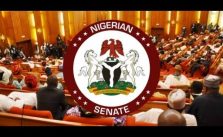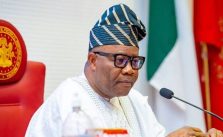Category: Politics
-
Special Advisers Forum passes vote of confidence on Gov Otu, declares no vacancy in govt house in 2027
By Kelvin Obambon Cross River Special Advisers Forum has passed a vote of confidence on the leadership of the state governor, Senator Prince Bassey… Read More

-
Anambra 2025: We have no special candidate in the guber race, INEC
By Ovat Abeng The Anambra State Resident Commissioner of the Independent National Electoral Commission (INEC), Dr. Queen Elizabeth Ugwu, has announced that the Commission under… Read More

-
Anambra lawmaker decries high rate of illegalities among Soludo’s aides
By Ovat Abeng The member representing Oyi Constituency at the Anambra State House of Assembly, Hon. Innocent Ojike has decried high rate of illegalities among… Read More

-
The Difference is Clear: Protecting the Senate from Political Manipulation, Not Rewarding Falsehood
Dr. Abubakar Bukola Saraki’s appeal for transparency and institutional protection is noted, but his attempt to draw a parallel between his own past case and… Read More

-
Forum flays Akpabio, C’River senators over marginalization in federal appointments
A political pressure group, the Cross River South Consultative Forum (CRSCF), has criticized the President of the Nigerian Senate, Senator Godswill Akpabio, and the three… Read More

-
How the Trump-Zelenskyy debacle unravelled — and where it leaves Starmer
Donald Trump’s performance, together with that of vice president Vance and his White House media coterie, had all the qualities of an ambush. Volodymyr Zelenksyy… Read More
-
2025 guber: Anambra LG workers endorse Soludo for second term
By Ovat Abeng Workers from the 21 local government areas of Anambra, have endorsed governor Chukwuma Charles Soludo for a second term in office come… Read More

-
Anambra 2025: Soludo has no credible opposition in race – APGA Chieftain, Okoye insists
By Ovat Abeng A Chieftain of the All Progressives Grand Alliance (APGA) and a former member of the Anambra State House of Assembly representing Anoacha… Read More

-
Anambra 2025: YPP begins sale of guber form March 1
By Ovat Abeng National leadership of the Young Progressive Party (YPP), has begun the sale of nomination form for the November 8, 2025 governorship election… Read More

-
Group slams Akpabio over alleged disrespect to female lawmakers
By Ovat Abeng A group, Women of Substance for Development and Skill Empowerment Initiative, has condemned the Nigeria Senate President, Senator Godswill Akpabio for allegedly… Read More
